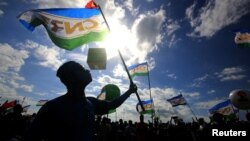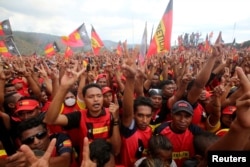East Timor's two main political parties won enough votes in a weekend parliamentary election to form another national unity government but lost ground to opposition forces in a sign of frustration with slow economic progress.
With all votes counted on Monday, the National Congress for Timorese Reconstruction party of independence hero Xanana Gusmao, or CNRT, had won 29.5 percent, down from 36.7 percent in 2012, when it was the top-polling party. Fretilin, or Revolutionary Front for an Independent East Timor, captured 29.7 percent of the vote.
Fretilin declared itself the victor on Sunday and to loud applause and cheers of "Viva Fretilin'' its secretary-general Mari Alkatiri said it is open to forming a coalition with CNRT.
The vote Saturday was East Timor's first parliamentary election without U.N. supervision since peacekeepers left in 2012. The U.S. State Department called it a "major milestone'' in a statement commending the country for "an electoral process that was well-managed, credible, and accountable to the people.''
The former Portuguese colony voted overwhelmingly for independence in 1999 after 24 years of brutal Indonesian occupation. Indonesia's military and pro-Indonesian militias responded to the independence referendum with scorched earth attacks that devastated the East Timorese half of the island of Timor.
In recent years, leaders have focused on big-ticket infrastructure projects to develop the economy, funding them from a dwindling fund of former oil riches, but progress is slow. Today, the country of 1.3 million people still faces poverty, with many lacking clean water and sanitation. Unemployment is high and young people are increasingly going overseas for work.
The Popular Liberation Party, a new political force led by former President Taur Matan Ruak, and the Democratic Party each scooped up about 10 percent of the votes. A new youth party, Khunto, got about 6 percent of the vote, which would give it 5 seats in the 65-member parliament.
Nearly two dozen parties contested the election, in which they must win more than 4 percent of the vote to get seats in parliament. Results will be official once certified by the country's Court of Appeal, likely later this week.
In the first few years after the independence, Fretilin, whose paramilitary arm had waged guerrilla warfare against Indonesia's occupation, was popular enough to form a government alone.





